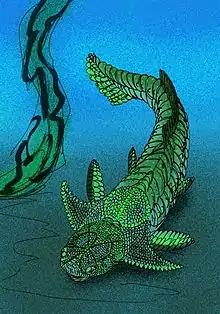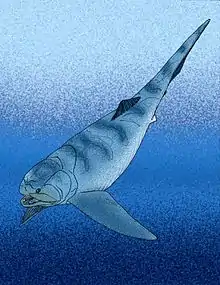Camuropiscidae
Camuropiscidae is a family of mostly small, bullet or spindle-shaped arthrodire placoderms from the Late Devonian. With the exception of the snub-nosed Simosteus,[4] camuropiscid placoderms are characterized by an elongated, tubular snout. The entire family is restricted to the Frasnian Gogo Reef Formation of Australia.
| Camuropiscidae | |
|---|---|
 | |
| Scientific classification | |
| Kingdom: | |
| Phylum: | |
| Class: | |
| Order: | |
| Family: | Camuropiscidae |
| Type species | |
| Camuropiscis concinnus Dennis & Miles, 1979[1] | |
| Genera | |
The camuropiscids' elongated snouts and bullet-shaped bodies are thought to be adaptions for hydrodynamic streamlining. They are assumed to have been mid-water predators of shrimp-like crustaceans.
References
- Dennis, Kim; R. S. Miles (September 1979). "A second eubrachythoracid arthrodire from Gogo, Western Australia". Zoological Journal of the Linnean Society. 67: 1–29. doi:10.1111/j.1096-3642.1979.tb01102.x.
- Dennis, K.; R. S. Miles (1979). "Eubrachythoracid arthrodires with tubular rostra1 plates from Gogo, Western Australia". Zoological Journal of the Linnean Society. 67: 297–328. doi:10.1111/j.1096-3642.1979.tb01118.x.
- Long, J. A. (1990). "Two new arthrodires (placoderm fishes) from the Upper Devonian Gogo Formation, Western Australia". Memoirs of the Queensland Museum. 28: 51–64.
- Dennis, K.; R. S. Miles (1982). "A eubrachythoracid arthrodire with a snubnose from Gogo, Western Australia". Zoological Journal of the Linnean Society. 75: 153–166. doi:10.1111/j.1096-3642.1982.tb01945.x.
- Long, J. A. (1988). "A new camuropiscid arthrodire (Pisces: Placodermi) from Gogo, Western Australia". Zoological Journal of the Linnean Society. 94: 233–258. doi:10.1111/j.1096-3642.1988.tb01194.x.
This article is issued from Wikipedia. The text is licensed under Creative Commons - Attribution - Sharealike. Additional terms may apply for the media files.


